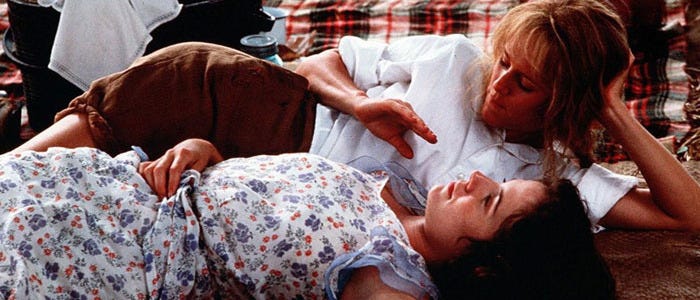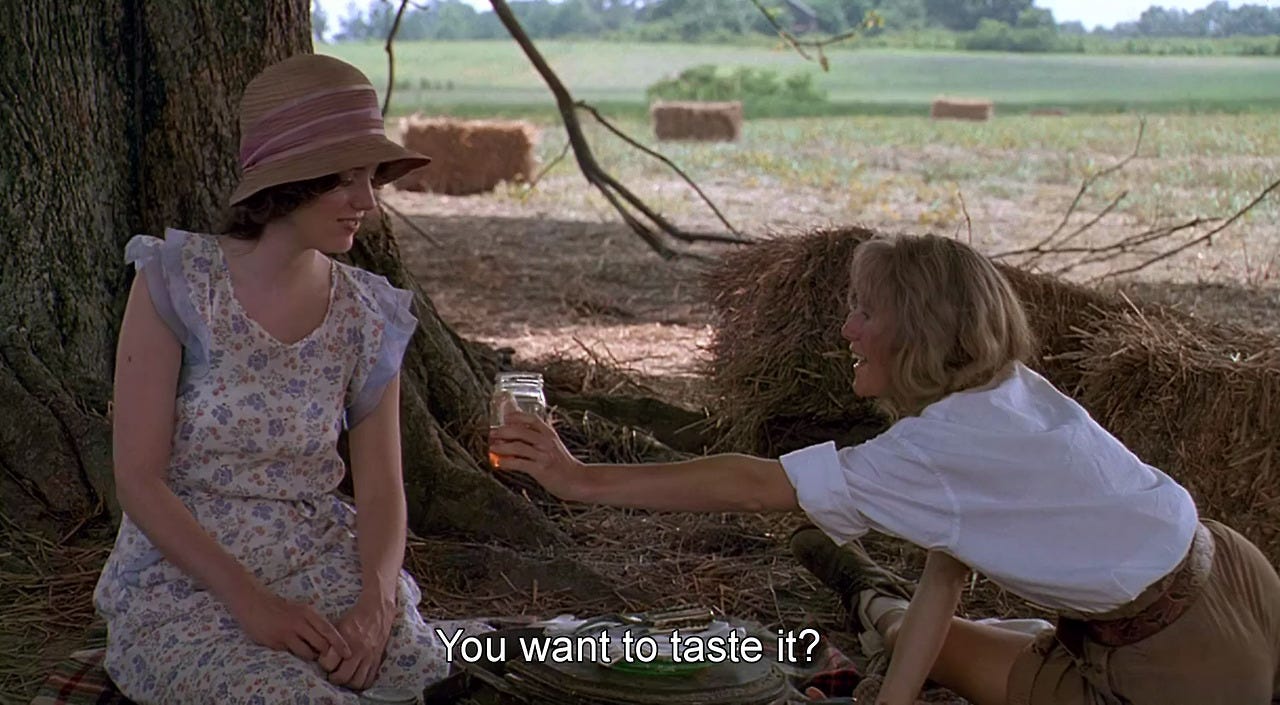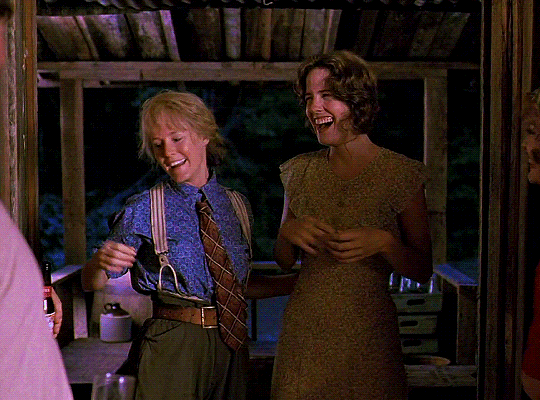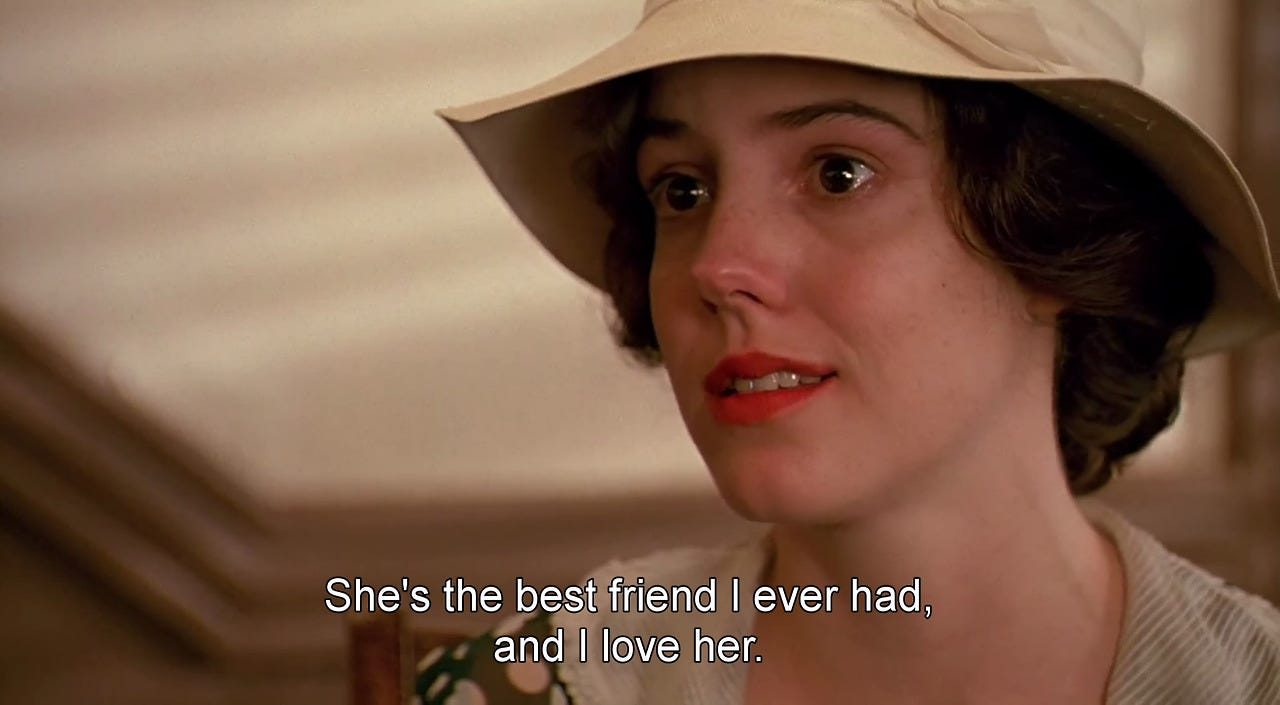Paging Dr. Lesbian - Lesbians, redacted
Do you like lesbians? Do you like pop culture? Then you should subscribe to this newsletter. Even better, you should sign up for a paid subscription, which will get you more sweet sapphic content and allow me to keep writing things like this. The 1991 film Fried Green Tomatoes has the unique distinction of being a non-lesbian lesbian movie, or maybe a lesbian movie with no explicit lesbianism in it, or perhaps just a lesbian movie where the lesbianism remains (mostly) unspoken. Whatever you want to call it – most queer fans of the film probably would call it a lesbian film – the movie is a fascinating example of what happens when you try to extract the lesbianism from something, yet its essence remains. The film begins in the present day (aka the early ‘90s), and follows Evelyn Couch (Kathy Bates), a restless housewife who meets Ninny Threadgoode (Jessica Tandy), an 80-year-old woman who tells her about her hometown of Whistle Stop, Alabama, and its eclectic residents. The protagonists of her story are Idgie Threadgoode (Mary Stuart Masterson), a rebellious tomboy, and Ruth (Mary Louise Parker), a devout church girl. Idgie and Ruth open the Whistle Stop Cafe and live together for the rest of their lives. The 1987 Fannie Flagg book on which the film is based is more explicit about Idgie and Ruth being a romantic couple, as the omniscient narrator – as well as the townspeople – clearly understand them in this way, even if it’s not spoken about using terms we would use today. The movie makes things a bit more ambiguous. As was likely the intention, Fried Green Tomatoes has been viewed in different ways by different groups of people. The film’s director, Jon Avnet, is clearly aware of the film’s lesbian under-(and over)-tones, and has frequently described the film as “romantic.” Nonetheless, his views on Idgie and Ruth aren’t what we might call progressive, as you can hear him in the director’s commentary saying “look at Mary-Louise’s reaction to Mary Stuart’s testosterone-induced bravado.” In 2016, Mary Stuart Masterson said there were several scenes that were cut that would have made the romantic nature of their relationship more obvious. In her words, the movie was “redacted” in comparison to the book. Fannie Flagg, who co-wrote the screenplay, was circumspect in her discussions about the film at the time. ”It’s not a political film at all. It’s about the possibilities of people being sweet and loving each other,” she told Entertainment Weekly in 1992. She also noted that because it’s a mainstream movie, it can appeal to everyone who goes to see it. In this same profile of the film, Avnet noted “You can take it how you want to. I had no interest in going into the bedroom.” Despite this obvious hedging about the film’s message, GLAAD honored the film with an award for “the best feature film with lesbian content.” GLAAD’s executive director at the time, Ellen Carton, was quoted as saying “Tomatoes‘ filmmakers may have wanted to tone down the lesbian content. Too bad. But we recognize these women as lesbians. And giving the award is a way for us to acknowledge that these are lesbians.” Even as she was honoring it, Carton was also critical of the film, suggesting that the studio was “trying to have it both ways.” Though it has been criticized for removing any “explicit” signs of lesbianism, the film has long been enjoyed and celebrated by lesbian and queer audiences. Buzzfeed’s Kate Arthur described her experience of seeing the film in theaters for the first time as a young lesbian and recalls the huge impact it had on her. In Xtra Magazine, Ingrid Randoja calls Ruth and Idgie an “iconic (but closeted) onscreen butch/femme duo,” and notes that the film was “the gift we didn’t expect.” If you search on YouTube, you can find numerous fan videos chronicling Ruth and Idgie’s relationship from a romantic standpoint. (There are even some set to Taylor Swift songs, which is when you know a sapphic couple has made an impact.) Frankly, it’s difficult to miss the film’s lesbian subtext, and this aspect of the movie was noted by some straight viewers as well. In his review of the film, famed critic Roger Ebert wrote “It's pretty clear that Idgie is a lesbian, and fairly clear that she and Ruth are a couple.” And yet, the film has continued to be described as a film about friendship. The google description of the film describes Idgie and Ruth simply as friends, and the synopsis on Amazon calls their relationship a “special friendship.” In a Southern Living article updated in 2022, the film is described as “one of the greatest friendships in Southern fictional history.” Is this what we are left with when the lesbianism is redacted? Is it simply friendship, or the shadow of a love story? A review of the film itself reveals that all is not lost, even with all the alterations that were made. From the start of the film, we are immediately made aware that Idgie is a tomboy, and, implicitly, that she’s also a lesbian. When she comes down the stairs in an ill-fitting dress and scraped knees, her nonconformity is readily apparent. Ruth, on the other hand, as Idgie explains later in the film, is an “angel who walks on earth.” She’s selfless and devout, and everyone in town is a little bit in love with her. The only person who Idgie can stand being around is her big brother Buddy, and when he dies in an accident, Idgie leaves her family behind. The only one who can bring her back around is the good-spirited Ruth, and the two quickly become quite close. The film is full of implicitly romantic and/or sexual scenes between the two women. The first – and arguably most important – is the bee-taming scene. Idgie goes to collect a jar of honey by sticking her entire arm inside a beehive, and Ruth watches, transfixed. (She looks both terrified and enamored.) In the film, Ruth tells Idgie “You’re just a bee charmer, Idgie Threadgoode, that’s what you are.” In the book, the importance of the scene is more explicit. During this moment, Idgie is “as happy as anybody who is in love in the summertime can be,” Flagg writes. Then, of course, there’s the kiss on the cheek. It’s Ruth’s birthday, and Idgie has taken her to her local haunt, The River Club. They play baseball and go swimming in their skivvies, and Ruth tells Idgie this is the best birthday she’s ever had before kissing her on the cheek. Idgie looks stunned, probably in part from the kiss and in part due to the fact that Ruth’s just told her she’s getting married at the end of the summer. One of the most heated moments between Ruth and Idgie is the famous food fight scene, which ends with Ruth and Idgie covered in flour and laughing hysterically. When the sheriff comes in and threatens to arrest them for disorderly conduct, they only laugh harder, acting as if they are drunk or high (on love, perhaps). In the director’s commentary, Avnet explicitly calls the food fight a “love scene,” which is spot-on. Indeed, most two-person food fight scenes on screen wind up becoming romantic or sexual in some capacity, leaving viewers with some fairly obvious hints as to what this moment really signifies.¹ Of their relationship, Roger Ebert wrote that it’s “fairly clear that [Idgie] and Ruth are a couple, although given the mores of the South at the time a lot goes unspoken, and we are never quite sure how clear that is to Ruth.” This, I think, is a misconception based on the fact that Idgie reads more clearly as a lesbian than Ruth does. The way I see it, Ruth is simply more practical (and less privileged) than Idgie is, and she doesn’t feel that a life with Idgie is possible. In the book, Flagg describes Ruth’s thoughts as she’s about to go off and marry her abusive husband, Frank.
Ruth’s thought process is much less obvious in the film, but Parker does her best to transmit these feelings on her face, and through her affectionate interactions with Masterson. In the novel, it’s clear the townspeople are aware that Idgie and Ruth are a couple. This acknowledgment is not as clear in the film, but it’s still present. Some time after Ruth told Idgie to stay away, she sends Idgie an announcement of her mother’s death and a passage from The Book of Ruth: “...whither thou goest, I will go; and where thou lodgest, I will lodge: thy people shall be my people, and thy God my God,” the passage reads.² Idgie’s mother reads the quote to her, and it’s clear she knows exactly what it means for both of them. (It's simply the most romantic proposition of U-hauling I've ever heard.) The closest Ruth and Idgie ever get to publicly declaring their love happens in a courtroom. Idgie and Big George are on trial for Frank’s murder, and the lawyer insinuates that Idgie is a deranged lesbian (which she doesn’t exactly refute). Ruth then gets on the stand and tells the courtroom how much she loves Idgie. If that wasn’t proof enough, Ruth even gets the town preacher to lie on the stand in order to save Idgie and Big George from prosecution. After the trial is over, Idgie and Ruth live several happy years together, running the cafe and raising Ruth’s son, Buddy Jr. (In the book, Buddy is explicitly referred to as their son, though the movie doesn’t quite use this language.) Then Ruth gets cancer, and dies shortly after. Idgie is terrified of letting Ruth go, and tearfully tells her “there’s so many things I want to say to you.” It’s probably fair to assume that Ruth and Idgie have said they loved each other many times by this point, so it’s not entirely clear what Idgie means by this. If you understand their story as a lesbian romance, you’re likely under the impression that their love was consummated a long time ago, although the script may say otherwise. Maybe, then, we can read this line as an admission not of what Ruth and Idgie haven’t said, but what they haven’t been allowed to say. Lesbianism redacted, as it were. Like Ellen Carton correctly diagnosed in 1992, the end of the film does try to have it both ways. After all of their time together, Ninny tells Evelyn that what she’s learned is that friendship is the most important thing. Just after this, Ninny and Evelyn visit Ruth’s grave and find a jar of honey and a note from Idgie saying how much she still loves Ruth. (It’s also implied here that Ninny is Idgie, which has never made any sense to me.) Thus, you can read it either way. It’s a story about friendship, like Ninny spells out, or it’s a story about a lesbian couple who were the heart and soul of a small Alabama town. (Or perhaps, you might argue, it’s about both things.) So now we’re left with this question once more. When categorical displays of lesbian love are omitted, what remains? For one thing, there’s still gender. As Ingrid Randoja writes in Xtra, Ruth and Idgie can easily be understood as a butch/femme couple, though in this case Idgie’s butchness is subsumed under the moniker of “tomboy” and Ruth is simply seen as “normal.” But Ruth and Idgie recognize their love for one another, and we, as audience members, recognize ourselves and each other in their dynamic. The lesbian reverberations are conducted not just between Ruth and Idgie, but between the audience and the screen as well. There are many elements of their relationship that we can recognize as lesbian love, even if it’s never named as such. Over the course of their years together, we see Ruth and Idgie express jealousy, care, affection, romance, and familial devotion, both out in the open and behind closed doors. In this case, we might surmise that there is something ineffable about lesbian relationships, something visible but beyond (or hidden behind) words. Ruth and Idgie are hidden in plain sight, like lesbians have been for decades, or even hundreds of years. We talk a lot about lesbian visibility these days, and Fried Green Tomatoes both upholds and complicates the importance of this tenet. The lesbian story of the film has been concealed, but also has been claimed and made visible nonetheless. Through this sapphic insistence, the lesbian narrative permeates in between words, through gestures, and through the stories we tell about ourselves. 1 The example that always comes to mind for me is Lucas and Peyton’s food fight on One Tree Hill. 2 I’m compelled to note here that this isn’t the only time a devout lesbian uses this exact bible passage to reunite with the love of her life – it’s also used by Sydney on Saving Hope. You’re a free subscriber to Paging Dr. Lesbian. For the full experience, which includes weekly dispatches from the lesbian internet, become a paying subscriber. Your support means a lot! |
Older messages
Oh, The Height!
Sunday, October 2, 2022
Or, Why Are Sapphics So Obsessed With Height Differences?
Bad Girls Rule, Good Girls Drool
Sunday, September 25, 2022
From Cynicism to Optimism in 'Cruel Intentions' and 'Do Revenge'
‘Harley Quinn’ Is a Demented Dream
Sunday, September 18, 2022
Or, The Comic Book Show Where The Sapphic Couple Is Forever
dispatch from lesbian mommies
Thursday, September 15, 2022
and something about a certain septuagenarian bisexual
Lesbian Liberation
Sunday, September 11, 2022
Butch and Femme Freedom in the Wachowskis' Lesbian Neo-Noir
You Might Also Like
Glen Powell to the (couture) rescue
Monday, March 10, 2025
— Check out what we Skimm'd for you today March 10, 2025 Subscribe Read in browser But first: our editors' cult-status products Update location or View forecast Good morning. While we might
Deporting Undocumented Workers Will Make Housing More Expensive
Monday, March 10, 2025
The effect will be most pronounced in Texas and California ͏ ͏ ͏ ͏ ͏ ͏ ͏ ͏ ͏ ͏ ͏ ͏ ͏ ͏ ͏ ͏ ͏ ͏ ͏ ͏ ͏ ͏ ͏ ͏ ͏ ͏ ͏ ͏ ͏ ͏ ͏ ͏ ͏ ͏ ͏ ͏ ͏ ͏ ͏ ͏ ͏ ͏ ͏ ͏ ͏ ͏ ͏ ͏ ͏ ͏ ͏ ͏ ͏ ͏ ͏ ͏ ͏ ͏ ͏ ͏ ͏ ͏ ͏ ͏ ͏ ͏ ͏ ͏ ͏ ͏ ͏
The Viral "Jellyfish" Haircut Is 2025's Most Controversial Trend
Monday, March 10, 2025
So edgy. The Zoe Report Daily The Zoe Report 3.9.2025 The Viral "Jellyfish" Haircut Is 2025's Most Controversial Trend (Hair) The Viral "Jellyfish" Haircut Is 2025's Most
Reacher. Is. Back. And Alan Ritchson's Star is STILL Rising
Sunday, March 9, 2025
View in Browser Men's Health SHOP MVP EXCLUSIVES SUBSCRIBE THIS WEEK'S MUST-READ Reacher. Is. Back. and Alan Ritchson's Star is STILL Rising. Reacher. Is. Back. and Alan Ritchson's Star
12 Charming Movies to Watch This Spring
Sunday, March 9, 2025
The sun is shining, the tank is clean – it's time to watch some movies ͏ ͏ ͏ ͏ ͏ ͏ ͏ ͏ ͏ ͏ ͏ ͏ ͏ ͏ ͏ ͏ ͏ ͏ ͏ ͏ ͏ ͏ ͏ ͏ ͏ ͏ ͏ ͏ ͏ ͏ ͏ ͏ ͏ ͏ ͏ ͏ ͏ ͏ ͏ ͏ ͏ ͏ ͏ ͏ ͏ ͏ ͏ ͏ ͏ ͏ ͏ ͏ ͏ ͏ ͏ ͏ ͏ ͏ ͏ ͏ ͏ ͏ ͏
10 Ways to Quiet Annoying Household Noises
Sunday, March 9, 2025
Digg Is Coming Back (Sort Of). Sometimes the that's noise bothering you is coming from inside the house. Not displaying correctly? View this newsletter online. TODAY'S FEATURED STORY 10 Ways to
The Weekly Wrap # 203
Sunday, March 9, 2025
03.09.2025 ͏ ͏ ͏ ͏ ͏ ͏ ͏ ͏ ͏ ͏ ͏ ͏ ͏ ͏ ͏ ͏ ͏ ͏ ͏ ͏ ͏ ͏ ͏ ͏ ͏ ͏ ͏ ͏ ͏ ͏ ͏ ͏ ͏ ͏ ͏ ͏ ͏ ͏ ͏ ͏ ͏ ͏ ͏ ͏ ͏ ͏ ͏ ͏ ͏ ͏ ͏ ͏ ͏ ͏ ͏ ͏ ͏ ͏ ͏ ͏ ͏ ͏ ͏ ͏ ͏ ͏ ͏ ͏ ͏ ͏ ͏ ͏ ͏ ͏ ͏ ͏ ͏ ͏ ͏ ͏ ͏ ͏ ͏ ͏ ͏ ͏ ͏ ͏ ͏ ͏ ͏ ͏ ͏ ͏ ͏
Weekend: Introducing the Butt Mullet Dress 👀
Sunday, March 9, 2025
— Check out what we Skimm'd for you today March 9, 2025 Subscribe Read in browser Header Image But first: Join the waitlist for a new premium Skimm experience Update location or View forecast
Starting Thursday: Rediscover Inspiration Through Wordsworth
Sunday, March 9, 2025
Last chance to register for our next literary seminar starting March 13. March Literary Seminar: Timothy Donnelly on William Wordsworth Rediscover one of the most influential poets of all time with
5 little treats for these strange and uncertain times
Sunday, March 9, 2025
Little treat culture? In this economy?




